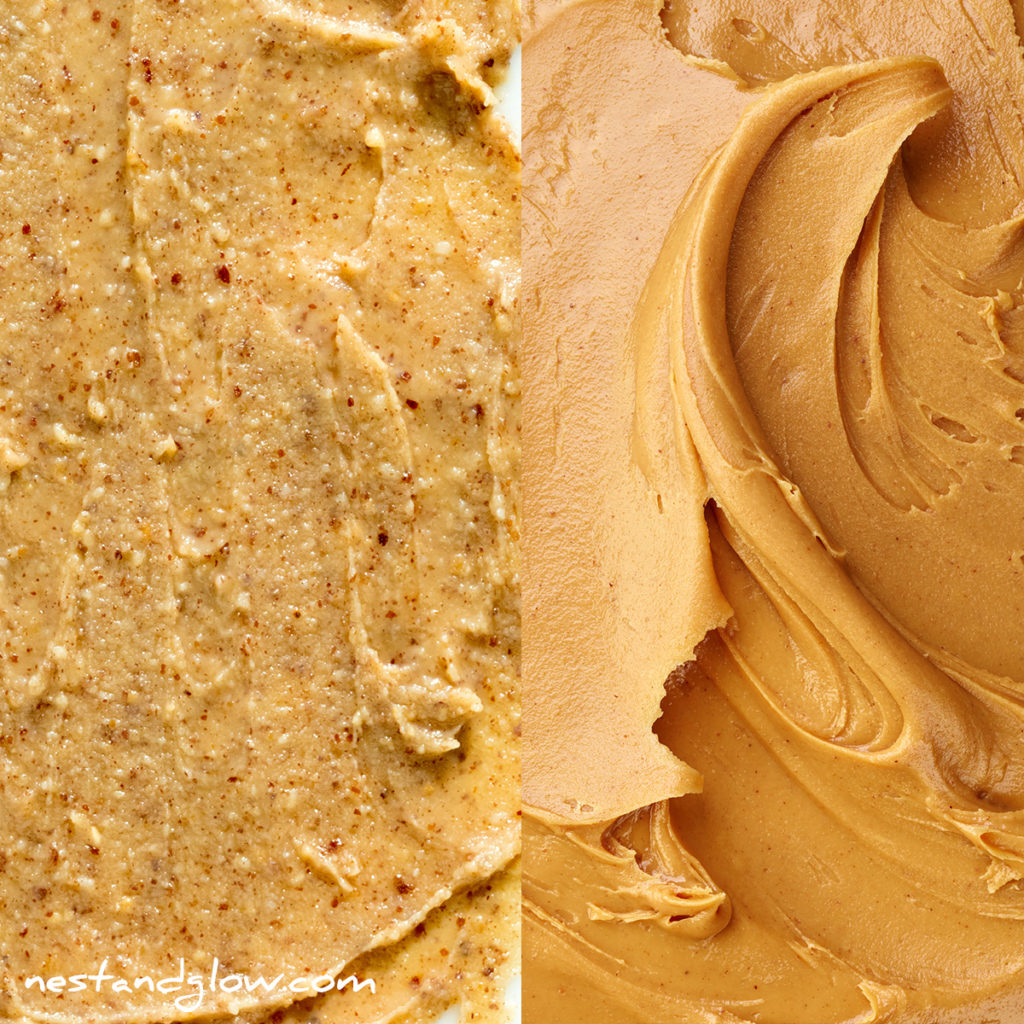
Peanut butter is known the world over and is one of the most popular and versatile spreads. It’s important to know the different types of peanut butter and how to eat them as part of a healthy diet.
It’s made simply by blending roasted peanuts into a liquid. For many people the taste and texture of peanut butter is amazing.
Peanut butter is relativity inexpensive and contains a high amount of protein and fat. In this article I’ll explore using an evidence-based approach if peanut butter is good or bad for your health. Answering the question: is peanut butter healthy?
Not All Peanut Butters Are Created Equal
Most peanut butter in the shops is not pure. Manufacturers often add unhealthy oils, salt, sugar, flavourings, artificial sweeteners and even trans fats.
Unpure peanut butter reduces the cost to the manufacturer, yields higher profits, gives a longer shelf life and enhances the flavour for some peoples tastebuds. Sugar, sweeteners and trans fats are all detrimental to our health.
Real peanut butter should contain only peanuts with no added oil or sugar, a pinch of salt is the only acceptable addition.
Pure peanut butter is more expensive, but like so many things in life you get what you pay for and if you’re concerned with health it’s worthwhile avoiding the junk peanut butter and only buying pure 100%. The healthiest peanut butter is one that’s 100% peanuts with nothing else.
Often pure peanut butter contains the skins – you can tell as it will have flakes of red or brown. These skins have been shown to be high in antioxidants and make peanut butter more nutritious.
Only pure peanut butter is a low FODMAP food. Pure peanut butter closeup:
Peanut Butter Nutrition
Peanut butter is about 50% fat, 25% protein and 20% carbohydrates by weight.
It’s a great protein source but as it doesn’t contain every amino acid it’s not a complete protein. That isn’t an issue as long as you have a varied diet and don’t just rely on peanuts alone for protein.
Peanuts are a legume as they grow underground in pods making them not true nuts.
Peanut butter is a nutritious food containing many vitamins and minerals including E, B3, B6, magnesium, iron, copper and manganese.
However as peanuts are high calorie with 1 tbsp containing 94 calories, it’s not nearly as nutritious as fruit or vegetables per calorie or serving. Natural peanut butter is low carb and suitable for a ketogenic diet.
Aflatoxins In Peanut Butter
These toxins are found in peanut butter and are produced by fungi as the peanuts grow.
Short term exposure to the aflatoxins in peanut butter seems to not affect humans much. But there’s little research into the long term risk.
Diets high in aflatoxins have shown links to liver cancer and impaired child growth. The same toxins can be found on other crops including corn and tree nuts.
However when peanuts are roasted to make peanut butter up to 90% of these toxins are destroyed.
The levels of aflatoxins allowed in foods are set by the EU so that peanut butter on the shelf is no immediate danger.
Hi Oleic Peanut Butter
There’s a new variety of hi-oleic peanuts that are now being sold that claim to be healthier.
Traditional peanuts and peanut butter made from them are about 50% oleic acid and high oleic peanuts are 70%. Oleic acid is a type of monounsaturated fatty acid that’s also found in olive oil and tree nuts.
High oleic peanuts are lower in the omega-6 linoleic acid.
Manufacturers of high oleic peanut butter claim that they help reduce monosaturated fats. There’s still ongoing research as to the importance of omega 3, 6 and 9 fatty acids and the correct ratio that’s optimal for health.
There’s limited unbiased research into the benefits of high oleic peanuts, but they may be a useful addition to add variation in a diet.
Final Worlds On Peanut Butter and Health
Yes peanut butter is a good source of nutrition but it’s not all good. Follow these tips to enjoy peanut butter as part of a healthy diet.
- Only consume pure peanut butter without additives.
- Don’t rely on peanut butter alone as a protein source or for a large part of your diet.
- Peanut butter does contain a toxin that can have a harmful effect on the body, so it’s best consumed in moderation as part of a varied diet.
- Small amounts of peanut butter occasionally is unlikely to cause any harm, but it shouldn’t be an everyday food.
- Keep reading for alternatives to peanut butter – as always the best diet advice is to eat a varied diet.
Healthy Alternatives To Peanut Butter
There’s lots of other nut and seed butter varieties that you can add to your diet that taste amazing and can be used as a direct replacement for peanut butter. All recipes are made from just whole food ingredients and are free of oil, dairy, sugar and junk.
Cashew Butter
Pure raw cashews make an amazing nut butter.
Sprouted Almond Butter
Almonds are soaked and sprouted in salted water to make one of the healthiest nut butters out there. Also known as activated almond butter.
Sunflower Seed Cookie Butter
All the taste of cookies in a raw spreadable healthy butter.
Coconut Butter
A great healthy alternative to coconut oil is this butter that is made from the whole coconut without anything taken away.